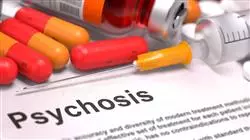University certificate
The world's largest faculty of psychology”
Introduction to the Program
Update your knowledge in Psychosocial Action in Psychotic Disorders through this complete program, where you will find the best didactic material with real clinical cases”

Through therapeutic approaches, which integrate both emotional support and the ability to cope with the practical challenges of daily life, Psychosocial Acting promotes the recovery and integral well-being of individuals. Therefore, by providing tools to improve social skills, autonomy and self-esteem, this form of intervention not only helps to manage psychotic symptoms, but also strengthens the adaptive capacity and improves the quality of life of those suffering from psychotic disorders.
This is how this Postgraduate diploma was created, which will address the intervention from the most relevant models, focusing on the identification and mastery of the clinical and prognosis of personality and psychotic disorders. In addition, the psychologist will be trained to use the specific pharmacological intervention for these disorders and to determine the appropriate moment to involve other professionals in the therapeutic process.
The syllabus will also focus on psychosocial intervention in Psychotic Disorders, emphasizing the importance of discerning between significant problems and the natural evolution in the family context. Skills will also be developed to manage the systemic psychopathology associated with these disorders, allowing a deeper understanding of the family and social dynamics that may influence the course of the illness.
In this way, TECH has designed a curriculum in a 100% online and totally flexible format, which adapts to the needs of professionals. They will only need an electronic device with an Internet connection to access all the contents anywhere and at any time. To this we must add the use of the revolutionary Relearning methodology, consisting of the reiteration of key concepts for an optimal and organic assimilation of knowledge.
On the other hand, this program boasts the participation of a prestigious international specialist in Psychology, who will give a series of exclusive and complementary Masterclasses, with the objective of delving into Psychotic Disorders.
A series of additional Masterclasses will be given by an internationally renowned expert to explain the most appropriate actions to take to care for patients with Psychotic Disorders”
The Postgraduate diploma in Psychosocial Action in Psychotic Disorders contains the most complete and up-to-date scientific program on the market. The most important features include:
- The development of case studies presented by experts in Psychosocial Action in Psychotic Disorders
- The graphic, schematic and eminently practical contents with which it is conceived gather scientific and practical information on those disciplines that are indispensable for professional practice
- Practical exercises where the self-assessment process can be carried out to improve learning
- Its special emphasis on innovative methodologies
- Theoretical lessons, questions to the expert, debate forums on controversial topics, and individual reflection assignments
- Content that is accessible from any fixed or portable device with an Internet connection
You will delve into follow-up models that reflect changes in pathologies related to stress and chronic mental states, providing practical tools for monitoring”
The program’s teaching staff includes professionals from the field who contribute their work experience to this educational program, as well as renowned specialists from leading societies and prestigious universities.
The multimedia content, developed with the latest educational technology, will provide the professional with situated and contextual learning, i.e., a simulated environment that will provide immersive education programmed to learn in real situations.
This program is designed around Problem-Based Learning, whereby the professional must try to solve the different professional practice situations that arise during the course. For this purpose, students will be assisted by an innovative interactive video system created by renowned experts in the field of educational coaching with extensive experience.
You will focus on mutations and new forms of illness in Personality Disorders, providing a solid foundation for a comprehensive approach to these cases"

This 100% online Postgraduate diploma will provide you with comprehensive training to effectively address Psychotic Disorders from a clinical and psychosocial perspective. Enroll now!"
Why study at TECH?
TECH is the world’s largest online university. With an impressive catalog of more than 14,000 university programs available in 11 languages, it is positioned as a leader in employability, with a 99% job placement rate. In addition, it relies on an enormous faculty of more than 6,000 professors of the highest international renown.

Study at the world's largest online university and guarantee your professional success. The future starts at TECH”
The world’s best online university according to FORBES
The prestigious Forbes magazine, specialized in business and finance, has highlighted TECH as “the world's best online university” This is what they have recently stated in an article in their digital edition in which they echo the success story of this institution, “thanks to the academic offer it provides, the selection of its teaching staff, and an innovative learning method aimed at educating the professionals of the future”
A revolutionary study method, a cutting-edge faculty and a practical focus: the key to TECH's success.
The most complete study plans on the university scene
TECH offers the most complete study plans on the university scene, with syllabuses that cover fundamental concepts and, at the same time, the main scientific advances in their specific scientific areas. In addition, these programs are continuously being updated to guarantee students the academic vanguard and the most in-demand professional skills. In this way, the university's qualifications provide its graduates with a significant advantage to propel their careers to success.
TECH offers the most comprehensive and intensive study plans on the current university scene.
A world-class teaching staff
TECH's teaching staff is made up of more than 6,000 professors with the highest international recognition. Professors, researchers and top executives of multinational companies, including Isaiah Covington, performance coach of the Boston Celtics; Magda Romanska, principal investigator at Harvard MetaLAB; Ignacio Wistumba, chairman of the department of translational molecular pathology at MD Anderson Cancer Center; and D.W. Pine, creative director of TIME magazine, among others.
Internationally renowned experts, specialized in different branches of Health, Technology, Communication and Business, form part of the TECH faculty.
A unique learning method
TECH is the first university to use Relearning in all its programs. It is the best online learning methodology, accredited with international teaching quality certifications, provided by prestigious educational agencies. In addition, this disruptive educational model is complemented with the “Case Method”, thereby setting up a unique online teaching strategy. Innovative teaching resources are also implemented, including detailed videos, infographics and interactive summaries.
TECH combines Relearning and the Case Method in all its university programs to guarantee excellent theoretical and practical learning, studying whenever and wherever you want.
The world's largest online university
TECH is the world’s largest online university. We are the largest educational institution, with the best and widest online educational catalog, one hundred percent online and covering the vast majority of areas of knowledge. We offer a large selection of our own degrees and accredited online undergraduate and postgraduate degrees. In total, more than 14,000 university degrees, in eleven different languages, make us the largest educational largest in the world.
TECH has the world's most extensive catalog of academic and official programs, available in more than 11 languages.
Google Premier Partner
The American technology giant has awarded TECH the Google Google Premier Partner badge. This award, which is only available to 3% of the world's companies, highlights the efficient, flexible and tailored experience that this university provides to students. The recognition as a Google Premier Partner not only accredits the maximum rigor, performance and investment in TECH's digital infrastructures, but also places this university as one of the world's leading technology companies.
Google has positioned TECH in the top 3% of the world's most important technology companies by awarding it its Google Premier Partner badge.
The official online university of the NBA
TECH is the official online university of the NBA. Thanks to our agreement with the biggest league in basketball, we offer our students exclusive university programs, as well as a wide variety of educational resources focused on the business of the league and other areas of the sports industry. Each program is made up of a uniquely designed syllabus and features exceptional guest hosts: professionals with a distinguished sports background who will offer their expertise on the most relevant topics.
TECH has been selected by the NBA, the world's top basketball league, as its official online university.
The top-rated university by its students
Students have positioned TECH as the world's top-rated university on the main review websites, with a highest rating of 4.9 out of 5, obtained from more than 1,000 reviews. These results consolidate TECH as the benchmark university institution at an international level, reflecting the excellence and positive impact of its educational model.” reflecting the excellence and positive impact of its educational model.”
TECH is the world’s top-rated university by its students.
Leaders in employability
TECH has managed to become the leading university in employability. 99% of its students obtain jobs in the academic field they have studied, within one year of completing any of the university's programs. A similar number achieve immediate career enhancement. All this thanks to a study methodology that bases its effectiveness on the acquisition of practical skills, which are absolutely necessary for professional development.
99% of TECH graduates find a job within a year of completing their studies.
Postgraduate Diploma in Psychosocial Action in Psychotic Disorders
At TECH Global University, we present our Postgraduate Diploma in Psychosocial Action in Psychotic Disorders, a program designed for psychology and mental health professionals who wish to acquire specialized knowledge in psychosocial intervention in psychotic disorders. This postgraduate course is taught through online classes, which gives you the flexibility to study from anywhere and at any time that is convenient for you. With the state-of-the-art technology of our virtual platform, you can access course content, participate in interactive activities and connect with experts in the field of psychology. Take advantage of the benefits of online education and organize your study time according to your professional and personal responsibilities. By choosing our Postgraduate Diploma, you will have the opportunity to gain up-to-date knowledge about psychotic disorders, their characteristics and their impact on people's lives. You will learn strategies and techniques of psychosocial intervention based on scientific evidence, which will allow you to provide effective support and improve the quality of life of your patients.
Learn about psychotic disorders at the world's best online university
Our teaching team is composed of professionals with extensive experience in the field of psychology and mental health. They will guide you throughout the program, providing you with the tools and knowledge necessary to understand and approach psychotic disorders from a psychosocial perspective. In addition, they will provide you with personalized support and feedback to help you achieve your academic and professional goals. Upon completion of our Postgraduate Diploma, you will be prepared to serve as a highly skilled professional in the psychosocial intervention of psychotic disorders. You will be able to work in various mental healthcare settings, collaborating with interdisciplinary teams to provide a comprehensive and quality approach to people suffering from these disorders. Don't miss the opportunity to expand your knowledge and make a difference in the lives of people suffering from psychotic disorders. Join TECH today!







